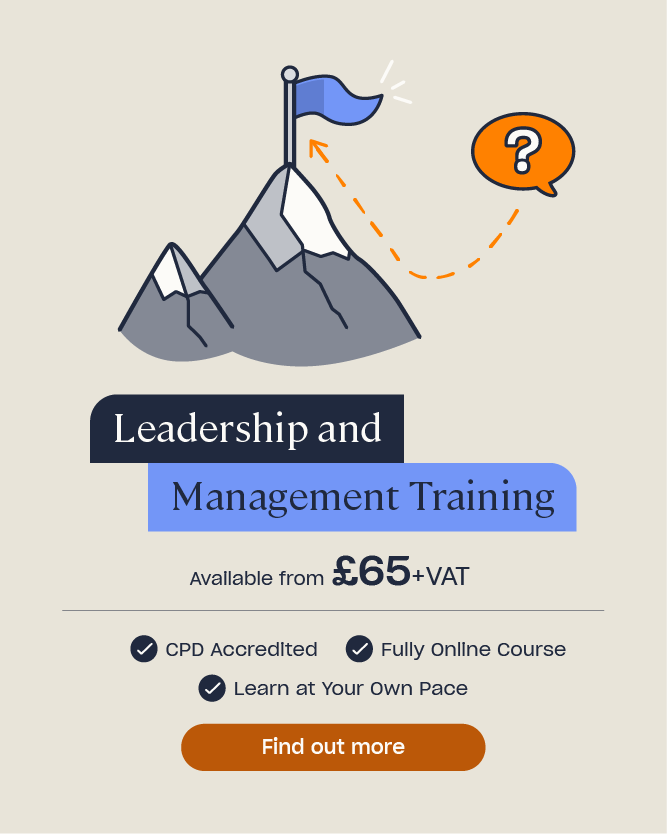10 Development Areas for Managers
As a manager, you are at the heart of your organisation, and the way you carry out your role has a direct impact on the performance of all employees. In fact, it’s been found that managers influence at least 70% of employee engagement. Therefore, prioritising areas of your personal and professional development in order to enhance your capability as a manager is paramount to a company’s overall success.
Identifying personal development areas will not only enhance your managerial skills, but will have a positive impact on the careers of both you and your team members. The benefits of manager development are clear, but where should you begin?
In this article, we will expand on the importance of personal growth for managers, explain how to identify a ‘good’ goal that will benefit both you and your team, and provide some examples of improvement areas that you may want to focus your development around.
What are Good Personal Development Goals for Managers?
Personal development consists of activities that develop your capabilities and potential, improve employability, and help you to realise goals or aspirations. This is particularly important for managers as it not only serves your own development, but it also has a positive impact on the members of your team and the wider organisation. Every action that a manager takes is intrinsically interconnected with the performance of the employees they manage, so improving your processes will have a knock-on beneficial effect further down the line.
In today’s world, the pace of change in business is constantly accelerating and thus it’s important to build on your current skills in order to keep up. As a manager, your ability to develop in line with this progress leads the way for the rest of your team, and therefore determines whether or not your organisation falls behind.

When planning your personal development goals as a manager, it’s important to consider the scope of their impact. A good development goal should aim to better yourself personally and enhance your career growth, whilst also improving your team’s performance.
Furthermore, good development goals should be tailored around your current strengths and weaknesses. Which areas of your role are you currently the least experienced or comfortable with? Working to develop your abilities in these areas will not only help you to widen your skillset and increase employability, but will improve your aptitude as the leader of your team.
Areas of Improvement for Managers
Your areas of improvement should be clearly defined and measurable. This helps make it easier to monitor your development over time and hold yourself accountable for achieving your goals.
When setting your areas of improvement, it may help to categorise your development points to ensure that they’re working towards the elements of a ‘good’ goal described above, such as progressing your career, becoming a better leader, and adapting to the future. The areas of improvement you identify should be unique to your individual needs, but we’ve provided 10 examples below that any manager could benefit from working on.
Progressing your Career
Productivity
Personal productivity impacts both the quality and quantity of work you produce. Improving your productivity will allow you to achieve more within a set amount of time, so you can finish your core tasks faster and be rewarded with more available time to assign towards other things, such as learning a new skill. To find out more about how to be more productive at work, check out our article, here.
Problem Solving
Staying calm and focusing on solutions in order to solve problems are positive skills for a manager to have. However, learning to prepare for problems before they appear and foreseeing where issues may arise can improve your problem-solving skills even further. You can do this by identifying areas that may need improving. This proactive approach to problem solving will ultimately reduce the number of problems you face in the future and create a smoother path to progress.

Personal Development Plan
Irrespective of your position in your organisation, setting personal goals is paramount to success. This can sometimes be forgotten by managers whose job revolves around the growth of their team. Creating and following a personal development plan of your own helps set a good example to employees and ensures you continue to progress in your own career.
Becoming a Better Leader
Active listening and Communication
Developing your communication will allow you to lead your team more effectively by explaining your vision, building close relationships and giving constructive feedback. This will ensure each team member is in sync and can continually improve their output to produce the best work possible.
The ability to actively listen is also a fundamental aspect of effective communication, and is paramount to good leadership. Active listening is when you listen with focused intent. As a team leader, employees will turn to you with concerns or questions, and active listening will help you to better understand these queries and improve your support. Find guidance on how to improve this skill in our article, here.
Rewards and Recognition
Praising the good work of individuals in your team helps massively to increase motivation and maintain working standards, so it’s well worth developing the recognition you give. One way to improve recognition is to structure your acknowledgments, perhaps by creating a set reward scheme for achievements such as reaching deadlines. This will also help you to gain the trust and respect of employees.

Delegation
Delegation can often be a challenge for managers, as it can be hard to know which tasks to take on yourself and which to pass on to members of your team. Strategic delegation is a key way to help empower your team, however, as it helps give employees more opportunities to develop their abilities by taking on new tasks. This helps create a stronger team overall and prevents you from becoming overworked, which will only reduce your leadership abilities.
Identifying Coaching and Mentoring Opportunities
The key to being a great leader is being able to encourage and orchestrate the development of your team members. Thus, you must be able to identify potential areas of growth for individuals in your team and help them on the best path to strengthening their skills. To improve your coaching and mentoring skills, it’s important to know when to take a directive or non-directive approach. Read our article on developing your coaching and mentoring skills to learn more.
Adapting to the Future
Technical skills
As the world of work undergoes a digital transformation, it’s encouraged that managers prioritise enhancing technical skills that will help them adapt to changing work processes. Think about the direction in which your industry is moving and which skills, software or working processes you may need to learn in order to keep up. If you stay on top of new working trends, you’ll also pave the way for all your team members to be forward thinking in their development too.
How prepared is your business for the rapidly changing future of work? Download our latest report to discover the key to keeping up in an age of digital transformation.

Adaptability and Flexibility
As much as we can try to predict trends for the future of work, we can’t always foresee what will change and what new skills we may need to continue working effectively in the future. Therefore, being able to quickly adapt to new practices is essential in not falling behind. Additionally it’s important to develop your flexibility as, although change can be hard to welcome, keeping an open mind is essential to accepting new and innovative solutions that could improve your output.
Growth Mindset
Perhaps the most important skill to develop, and one that can always be worked on, is your ability to maintain a growth mindset. A growth mindset means that you believe in your ability to continuously learn new things, develop new skills and adapt to new situations through determination and practise. Having a growth mindset helps make you more resilient, learn from mistakes and face challenges determinedly. This is an inspirational example to set for your team members, and therefore a growth mindset is perhaps the greatest mark of a good leader. To learn more about how to develop a growth mindset in the workplace, and its advantages, read our article on the subject, here.
Looking to Learn More?
Our Business Essentials Courses teach valuable core skills that will help you succeed in any industry. We highly recommend our Communication Skills Training and Leadership & Management Training to help you develop your abilities as a manager.
How Can Managers Support Employee Development?
It’s clear that a manager’s development is vital to not only their own career growth, but also to that of their team members who are directly influenced by their manager’s capability. But what more can you do to help support employees’ professional progress?
Every employee, generally, has an idea of milestones they’d like to reach in their career, but they may not know how to achieve these. It’s your responsibility as a manager to help guide employees through their development.
Before you can help your team members to work towards their goals, it’s important you have a good idea of what these aspirations are. Thus, you should organise regular 1-to-1 conversations with each employee to understand where their ambitions lie.

Once you know what each employee hopes to achieve, you can help them create personalised development goals that will help them succeed. Our article on personal development goals for work provides detailed guidance on how to set relevant targets, along with some examples, and may, therefore, help you to offer valuable advice.
As a manager’s principle role is to maintain a strong and productive team, ensuring that your employees are continuously improving their abilities and growing their skill set should be a priority. Ultimately, you’re only as good as your team and your success depends on theirs.
A manager’s development is important because not only does it help support your career growth, it also sets a good example for employee development which can strengthen your entire team. When finding development areas to pursue, it can be useful to categorise your goals to ensure they hit targets such as advancing your career, becoming a better leader, and adapting to the future. Working on these key areas will help you become a more well rounded and successful manager.
Further Resources:
- How to Motivate a Team
- 6 Types of Leadership: Which Leadership Style is Right For Me?
- How to Develop Coaching and Mentoring Skills
- Leadership & Management Training
- Report: The Future of Work
- Tips for First Time Supervisors
- Causes of Employee Turnover and Strategies to Reduce it
- The Consequences of a Lack of Training in the Workplace
- What is CPD? A Guide to Continuing Professional Development
- Writing A Professional Development Plan – Example & Template
- How to Deliver Effective Feedback in the Workplace
- How to Use Key Phrases in Performance Reviews & Appraisals











